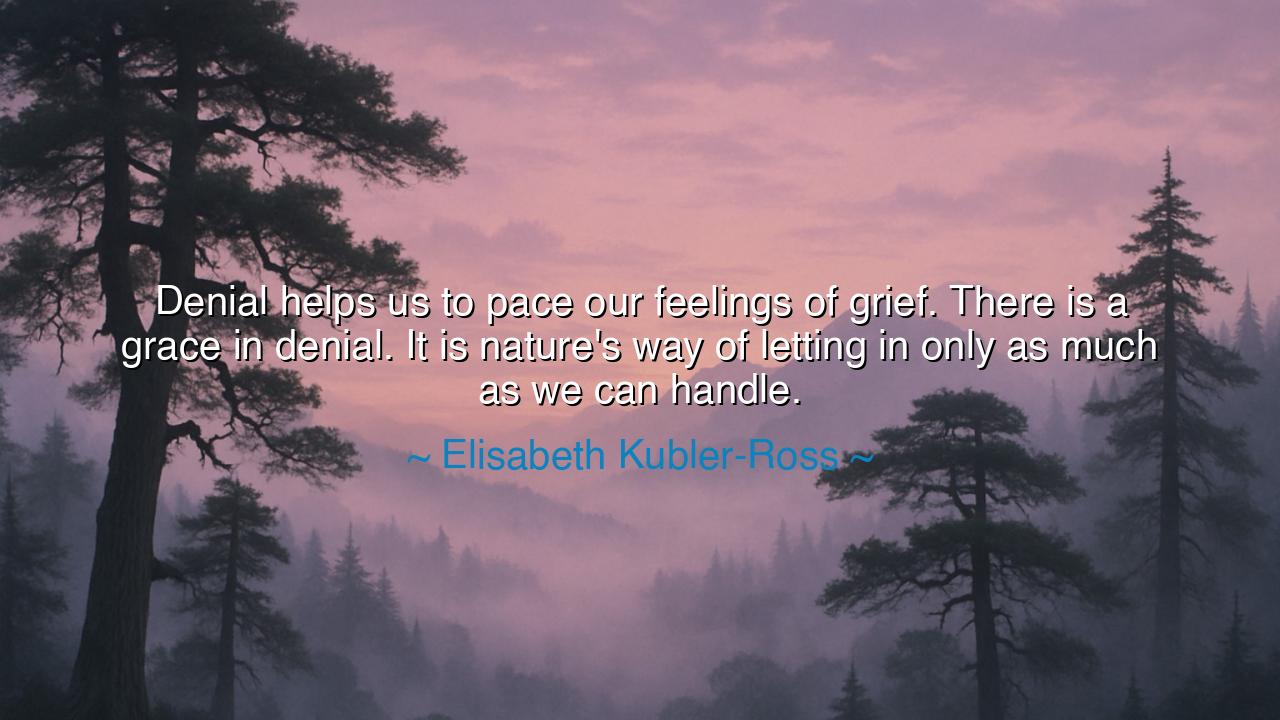
Denial helps us to pace our feelings of grief. There is a grace
Denial helps us to pace our feelings of grief. There is a grace in denial. It is nature's way of letting in only as much as we can handle.






Hear now, O children of sorrow and of hope, the tender words of Elisabeth Kübler-Ross: “Denial helps us to pace our feelings of grief. There is a grace in denial. It is nature’s way of letting in only as much as we can handle.” In these words lies a wisdom both gentle and profound. For grief is a storm too great to bear all at once; it threatens to break the vessel of the heart. And so denial, though it seems at first a weakness, is in truth a mercy, a veil placed by nature to protect us from the full blaze of our pain.
When loss strikes, the soul reels in confusion. A beloved vanishes, a dream is shattered, a bond is torn—and the heart cries out, “This cannot be.” At such times, denial steps forth like a guardian at the gate, saying, “Not yet, little by little.” It shields us from the unbearable weight, allowing the truth to seep in slowly, drop by drop, so that we are not consumed. Just as the eyes cannot look directly at the sun without blindness, so too the spirit cannot gaze upon the full light of grief without shattering. Denial grants us grace, a gentleness in the face of devastation.
Consider the widowed mother who, after her child’s death, still sets a place at the table. Outsiders may call it folly, but it is her soul’s way of pacing the storm. In time, she will move from denial to acceptance, but for now, the act of pretending sustains her through the unendurable. History, too, tells us of such truths. When Franklin D. Roosevelt died, a nation was struck dumb; many could not speak his name without tears, many acted as though he would still guide them. Their denial was not ignorance, but a shield, helping them endure until the heart could bear the truth of his absence.
Do not mistake this teaching. Kübler-Ross does not praise denial as a permanent refuge. To dwell forever in denial is to remain frozen, never healing. But to pass through denial as the first shelter in the storm—that is wisdom. For grief is a long journey, and nature gives us stages, steps along the path, so we may not collapse beneath its weight. Denial, anger, bargaining, depression, acceptance—all are stations along the road, and each has its purpose.
The lesson here is one of compassion, both for ourselves and for others. If you see one in denial, do not scorn them, nor press them too quickly toward the harsh light of reality. Understand that denial is a protective grace, a shield granted by nature. In time, the heart will open, when it has grown strong enough. Likewise, in your own sorrow, do not berate yourself for pretending, for struggling to accept. Trust that your soul knows its pace, and that this slowing is not weakness but survival.
Practical wisdom flows from this: in moments of grief, permit yourself to move gently. Do not force yourself to face the whole mountain at once. Take only what you can bear today. Write, weep, remember, or simply sit in silence—these are all steps. If denial comes, allow it to stay as a visitor, but know it will not stay forever. And if you walk beside one who grieves, be patient, be kind, and let them reveal their sorrow in their own time.
Thus, O seekers, let Kübler-Ross’s teaching be a balm to your heart: denial is not cowardice, but nature’s mercy. It is the soft cloth that binds the wound until healing may begin. Do not curse it, but honor it. For through it, you will be led, step by step, toward acceptance, toward peace, and toward the deeper strength that grief, in time, bestows.






AAdministratorAdministrator
Welcome, honored guests. Please leave a comment, we will respond soon